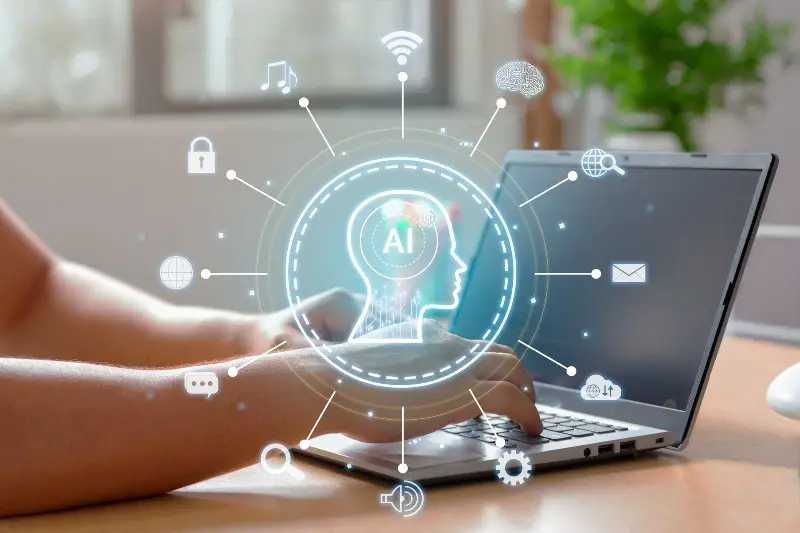Artificial Intelligence (AI) has been a groundbreaking force in various sectors, revolutionizing the way we interact with technology and perceive the future. Among its myriad facets, Black Box AI stands out as a concept that has intrigued and baffled many. Black Box AI refers to AI systems whose inner workings are not transparent or understandable, either due to the complexity of the algorithms or the lack of a clear explanation from the developers. This enigmatic aspect has raised numerous questions and concerns, making it a hot topic for discussion among experts and laypeople alike.
The intrigue surrounding Black Box AI stems from its widespread application across diverse fields, including healthcare, robotics, and privacy and security. These sectors have experienced significant transformations due to AI, with Black Box AI playing a pivotal role. Understanding this concept is crucial for tech enthusiasts, industry professionals, and the general public, as it shapes our interaction with AI-driven systems and influences our perception of technology’s role in society.
Healthcare: AI’s Revolutionary Impact
In the realm of healthcare, Black Box AI has been both a boon and a point of contention. Its ability to analyze vast amounts of medical data and provide insights has been invaluable in diagnosing diseases, predicting patient outcomes, and personalizing treatments. However, the opaqueness of these AI systems raises ethical and practical concerns. Medical professionals often find themselves relying on recommendations from AI systems whose reasoning they cannot fully comprehend or explain to patients.
Moreover, the integration of Black Box AI in healthcare necessitates a careful balance between technological advancement and human oversight. While AI can process and analyze data at an unprecedented scale, the lack of transparency in its decision-making process can be a significant barrier in clinical settings. Trust in these systems is paramount, and it can only be established if there is a better understanding of how these AI models arrive at their conclusions.
Robotics: The AI-driven Evolution
Robotics, another field profoundly impacted by Black Box AI, is witnessing a new era of autonomous machines capable of performing complex tasks. These robots, powered by AI, are becoming increasingly sophisticated, capable of learning and adapting to new environments. However, the ‘black box’ nature of their AI systems can make it difficult to predict or understand their actions fully.
This unpredictability poses a challenge, especially in scenarios where robots interact closely with humans. Ensuring safety and reliability in these interactions is crucial, and it requires a deeper understanding of the AI driving these robotic systems. As robots become more integrated into our daily lives, demystifying the Black Box AI within them becomes essential for fostering trust and ensuring harmonious human-robot coexistence.
Privacy and Security: A Double-Edged Sword
Privacy and security are at the forefront of discussions about Black Box AI. On one hand, AI has enhanced security systems through advanced surveillance and threat detection capabilities. On the other hand, the opaque nature of Black Box AI raises concerns about privacy invasion and the potential for misuse of sensitive data. Understanding how these systems process and make decisions about personal data is critical for maintaining public trust and ensuring ethical standards.
The balance between leveraging AI for security purposes and safeguarding individual privacy is delicate. As AI systems become more prevalent in security applications, it is imperative to establish clear guidelines and transparency standards. This will not only protect individual rights but also enhance the effectiveness of AI in security roles by building public confidence in
these advanced technologies.
Myths vs. Facts about Black Box AI
Myth 1: Black Box AI is Always Incomprehensible
Fact: While Black Box AI is often complex, efforts are ongoing to make these systems more interpretable. Researchers are developing techniques to unravel the decision-making processes of AI, aiming to make them more transparent and understandable.
Myth 2: All AI Systems are Black Boxes
Fact: Not all AI systems are black boxes. Many AI models, especially those based on simpler algorithms, are quite interpretable. The ‘black box’ nature primarily applies to complex deep learning models.
Myth 3: Black Box AI is Unreliable
Fact: Despite their opacity, many Black Box AI systems are incredibly reliable and accurate in their specific applications, often surpassing human performance in tasks like image recognition and data analysis.
FAQ Section
Q1: What makes an AI system a ‘Black Box’? A1: An AI system is termed a ‘Black Box’ when the inner workings of its algorithm are not transparent or easily understandable, especially in complex models like deep neural networks.
Q2: Why is Black Box AI a concern in healthcare? A2: In healthcare, the lack of transparency in AI decision-making can lead to ethical issues, such as difficulty in explaining diagnoses and treatment recommendations to patients.
Q3: How does Black Box AI affect robotics? A3: In robotics, Black Box AI can make it challenging to predict and understand the behavior of robots, raising safety and reliability concerns.
Q4: What are the privacy concerns related to Black Box AI? A4: Black Box AI can process personal data in ways that are not transparent, raising concerns about privacy invasion and misuse of sensitive information.
Q5: Are there efforts to make Black Box AI more transparent? A5: Yes, there’s ongoing research focusing on explainable AI (XAI), which aims to make AI systems more interpretable and their decisions more transparent.
Google Snippets
Black Box AI: “Black Box AI refers to artificial intelligence systems whose inner workings are not fully understood or transparent, often seen in complex neural networks.”
Explainable AI: “Explainable AI (XAI) is an emerging field focusing on making AI decision-making processes transparent, understandable, and accountable.”
AI in Healthcare: “AI in healthcare involves using algorithms and software to approximate human cognition in the analysis of complex medical data.”
Black Box AI Meaning: From Three Different Sources
Techopedia: “Black Box AI is a type of AI where the algorithm’s decision-making process is not visible to the user.”
Forbes: “Refers to AI systems where the rationale behind decisions or predictions is not easily decipherable.”
- Nature: “Involves AI systems whose internal logic is hidden from users, making understanding and interpreting their outputs challenging.”
Did You Know?
- Early Interpretability: In the early stages of AI, algorithms were simpler and more interpretable. The shift towards deep learning and complex neural networks marked the beginning of the Black Box era in AI.
- Bias in Black Box AI: Black Box AI can inadvertently encode biases present in the training data, leading to biased outcomes that are difficult to detect and correct due to the system’s opacity.
- Quantum Computing and AI: The future intersection of quantum computing and AI could potentially create even more complex Black Box systems, raising new challenges in interpretability and ethics.
Conclusion
Black Box AI, a term synonymous with the mysteries and complexities of advanced AI systems, represents both the pinnacle of technological advancement and a significant challenge in terms of transparency and ethics. Its implications in healthcare, robotics, and privacy and security highlight the need for a balanced approach that leverages the benefits of AI while addressing the risks associated with its opaque nature. As we continue to integrate AI into various aspects of our lives, efforts to make these systems more understandable and accountable will be crucial in building trust and ensuring that AI serves the greater good.
The exploration of Black Box AI, while filled with technical complexities, is essential for a future where technology and humanity coexist harmoniously. By demystifying these advanced systems, we can harness their full potential responsibly and ethically, ensuring that AI remains a tool for positive transformation and progress.
References
- Thinkful offers insights on how to address the “black box” problem in AI through Explainable AI (XAI) and transparency models. They discuss techniques like Feature Importance Analysis, Local Interpretable Model-agnostic Explanations (LIME), SHapley Additive exPlanations (SHAP), Model Distillation, and Decision Rules, which are designed to make AI models more interpretable and transparent. This is especially important in applications where decisions can have far-reaching consequences, such as healthcare or finance
- Superb AI‘s blog discusses the challenges of the reliability of AI and its adoption into society, given the opaque nature of black box models. The widespread use of AI technologies presents issues related to data bias, lack of transparency, and potential infringement on human rights. The article addresses how Explainable AI is crucial for building AI systems that are not only powerful but also trustworthy and accountable.






